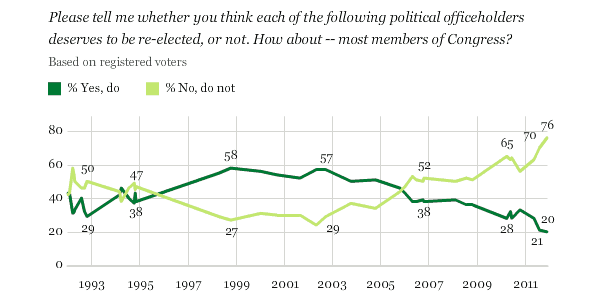According to a new Gallup poll released today, 76% of registered voters say members of Congress do not deserve to be reelected. More important, this is the highest such percentage measured by Gallup since the survey was first conducted 19 years ago.
This finding is from a Nov. 28-Dec. 1 Gallup poll, adding to the broad negativity toward Congress Americans have expressed this year. These include historically low congressional job approval ratings, low ratings of confidence in the legislative branch of government, and low ratings of confidence in Congress as an institution.The 76% who say most members of Congress "do not deserve to be re-elected" is six points higher than the previous high of 70%, measured in August.
The trends on this measure have been progressively more negative since 2004. Voters were also more negative than positive in response to this measure through most of the early 1990s, but at least half of voters said most members deserved to be re-elected in Gallup polls conducted between 1998 and 2004.
A substantial majority of Republican (75%), independent (82%), and Democratic (68%) voters agree that most members of Congress do not deserve re-election -- a sign of rare consensus about the legislative body in which both parties currently hold a leadership stake.
Evidently, this seems to be a precipitous drop since August. After the congressional gridlock that swept the nation culminating in the super committee’s failure to come up with $1.2 trillion in budget savings last month, these numbers certainly reflect voter disenchantment. Moreover, as expected, voters have a much more favorable opinion of U.S. representatives from their home districts. According to the same survey, 53% say their own congressman deserves another term. As Gallup notes, however, now that lawmakers have radically redrawn redistricting lines in numerous states – this was one of the reasons that prompted Barney Frank to retire, for example – it’s possible an increasing number of incumbents from both parties may lose their seats in 2012.

